Microsoft Salary Negotiation: How To Negotiate Your Microsoft Job Offer
There’s no doubt about it: getting a job offer is exciting. But negotiating a job offer—a key step for receiving better compensation—can be nerve-wracking, especially with a competitive company like Microsoft.
In this blog, we help alleviate those nerves by sharing everything you need to know to successfully negotiate your Microsoft job offer. Why should you listen to us? Because 100% of our clients have received more compensation when negotiating their Microsoft salary using our strategies.
Since Microsoft is one of the original and most successful global tech leaders, it offers competitive pay for software engineers, data scientists, and many business and product-based roles. Given this notoriety, many people assume the offer negotiation will be difficult. But it doesn’t have to be, especially if you know how to negotiate your Microsoft job offer effectively.
Below, we dive into each of the components you’ll find in your Microsoft offer and outline our recommended steps on how to negotiate higher compensation with Microsoft.
Want to Negotiate Your Microsoft Offer? Get offer-specific guidance from a Microsoft Salary Negotiation Coach. We help career professionals negotiate competitive job offers.
Or leverage our Salary Negotiation Courses and Salary Negotiation Templates.
 Job Offer Negotiation Course
Job Offer Negotiation Course
- Get our job offer negotiation strategies, templates, scripts, and guidance.
- Access our step-by-step lessons, compensation research guides, and tools.
- Access Now
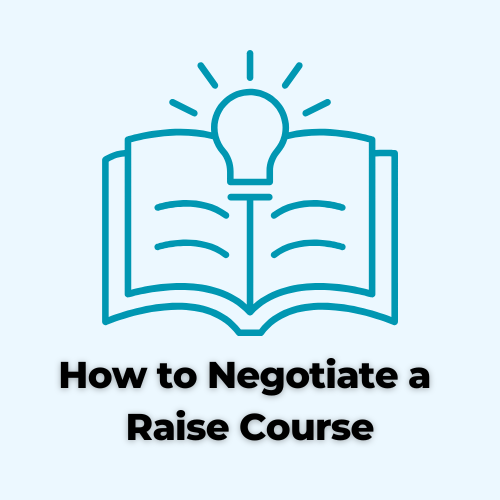 Raise Negotiation Course
Raise Negotiation Course
- Get our raise negotiation strategies, templates, scripts, and guidance.
- Access our step-by-step lessons, compensation research guides, and tools.
- Access Now
Understanding the Compensation Components of a Microsoft Job Offer
Compared to other non-tech companies, Microsoft’s salaries are competitive and their benefits are valuable. Your job offer at Microsoft will include multiple compensation components that you’ll need to understand before you start negotiating so you improve your chances of increasing your entire compensation package.
In addition to a base salary, Microsoft provides a yearly performance bonus, an initial equity grant, a sign-on bonus, and many other valuable benefits. While these additional components help them stand out from other companies, they can also add a layer of complexity when trying to calculate your total compensation.
Knowing how to calculate your total compensation is critical to your success in a salary negotiation so you must consider this when negotiating your Microsoft job offer. For example, here is what the total compensation of a Microsoft Software Engineer Salary (Senior SDE - Level 63) may look like in their initial offer:
Microsoft Senior Software Engineer Salary
MICROSOFT BASE SALARY
The first component in your Microsoft offer—and the one most people focus on—is your base salary. This is the guaranteed fixed payment you receive for the work you do, and it’s not tied to your performance. Microsoft does try to offer a competitive base salary in the tech industry and they’ve made steps to increase their compensation, but it can fall slightly lower compared to the FAANG companies.
At Microsoft, there’s a base pay range for each role type and level with a set minimum and maximum amount. For example, a Senior Software Engineer Microsoft would have a different base salary range than a Microsoft Senior Data Scientist salary or Microsoft Product Manager salary at the same level, and a different range from a Microsoft staff engineer salary. Your Microsoft base salary will unlikely be at the top end of the pay band in your initial offer, so it’s important to negotiate that higher.
MICROSOFT YEARLY PERFORMANCE BONUS
Microsoft offers a yearly target bonus that is based on both personal and company performance and is a percentage of your base salary. The recruiter will usually name a large percentage, but it’s best to ask them if they can provide the actual percentage so you can understand what’s accurate and realistic based on past performance for your role at this time. You can then use that percentage when evaluating your total compensation.
While the yearly bonus is a large component of your total yearly compensation at Microsoft, we have not found that it’s negotiable. That’s why it’s important to negotiate your base salary since your yearly bonus is a percentage of that number.
MICROSOFT INITIAL EQUITY PACKAGE
Equity is a key component that drives most job seekers to Microsoft. New employees to Microsoft will receive an initial equity grant in their job offers, which comes in the form of restricted stock units (RSUs). These RSUs represent actual ownership of stock (i.e., you will receive shares of MSFT stock) that will be transferred to you when the stock vest. Microsoft RSUs have a four-year Microsoft RSU vesting schedule with an initial one-year cliff, which means you’ll get your initial stock vest (25%) at the end of your first year and then your RSUs will vest quarterly (6.25%) over the remaining three years.
Microsoft Vesting Schedule
| Company | Vesting Period | Year 1 | Year 2 | Year 3 | Year 4 |
|---|---|---|---|---|---|
| Microsoft | 4 years (equal) | 25% | 25% | 25% | 25% |
The great news is that the Microsoft equity component is fully negotiable (the Microsoft vesting schedule is not though). This is an area where our clients have made large improvements during the salary negotiation with Microsoft regardless of whether it’s a Microsoft entry level software engineer salary, Microsoft director salary, Microsoft VP salary, or any other Microsoft roles and levels.
While Microsoft’s RSUs can be an extremely valuable form of compensation, note that they will fluctuate based on the market value of the company. In other words, if the company’s stock is doing great, you share in that success, but if they plummet, you’ll see that reflected in your stock.
If you leave Microsoft before the stock vests per the Microsoft RSU vesting schedule, you’ll forego that equity. This is where the term “Golden Handcuffs” comes from: it’s difficult to leave because the equity increases over your tenure and the opportunity cost for leaving increases.
MICROSOFT SIGN-ON BONUS
Microsoft’s sign-on bonus is a one-time bonus that new employees receive as an incentive to join and cover any lost bonuses or unvested equity that you may give up at your current company. You should receive a Microsoft sign-on bonus in your job offer, but if it wasn’t included right off the bat, you can—and should—negotiate for one. At The Salary Negotiator, we’ve helped all clients successfully negotiate a Microsoft signing bonus if they didn’t receive one initially.
Just like for a Meta job offer negotiation, it’s important to note that even if you don’t have a competing offer or you’re not walking away from money at your current company, you can still negotiate for a sign-on bonus. Relatedly, if Microsoft runs out of room to negotiate on your base salary and equity, this is where they’ll typically increase your compensation and gives you more leverage to negotiate.
Microsoft’s sign-on bonus is paid after your first 30 days in one lump sum payment. Just note that there are payback conditions tied to it—meaning you’ll need to pay back the bonus if you leave Microsoft within the first year.
MICROSOFT EQUITY REFRESHER
Microsoft offers an annual equity refresher (more stock) to most employees based on their role level.
Similar to Google and Meta, your Microsoft recruiter will usually withhold sharing information about the refresher—including when it will take place and the expected yearly amount—so this is something you should ask about during the negotiation to see if the recruiter will share any insight.
While this is an important component of your total compensation, we don’t include it in our total compensation calculation because recruiters are usually vague and speculative about details, making it hard to factor into your total compensation and compare across multiple offers.
BENEFITS AND PERKS AT MICROSOFT
Microsoft was one of the first companies to demonstrate that tech companies lead in the benefits and perks arena. They offer free health insurance, a generous Microsoft 401k match program, tuition reimbursement, and a discounted employee stock purchase plan (ESPP). Microsoft’s free health insurance makes it a leader in benefits compared to other tech companies, such as Amazon and Apple where health insurance is not free.
One of the best employee benefits available to high earning Microsoft employees is the Mega Backdoor Roth 401(k). This benefit improves the Microsoft 401k match which can help employees invest more in their retirement while lowering their future tax liability.
Five Key Steps to Negotiate a Microsoft Job Offer
Before you begin negotiating your offer at Microsoft, it's important to understand how to navigate the process effectively and respectfully.
We suggest waiting to start the negotiation until you have an offer in hand. You don’t want to jeopardize your chances of receiving the job offer by negotiating too early with Microsoft, and you’ll have more leverage once the hiring team has selected you as the ideal candidate for the role.
Based on our experience working with hundreds of clients on their salary negotiations, we’ve identified five key steps that will help you navigate your Microsoft salary negotiation. While these are the key steps to a Microsoft salary negotiation, we strongly recommend you work with a Microsoft Salary Negotiation Coach to ensure success in your Microsoft offer negotiation by getting all of our strategies.
1) UNDERSTAND THE COMPONENTS OF YOUR MICROSOFT JOB OFFER.
As we mentioned above, understanding the total compensation in your Microsoft job offer is the first step before attempting to negotiate your salary. But you’re already a pro because we’ve already laid out the components of your Microsoft offer letter: base salary, performance bonus, initial equity grant, sign-on bonus, and any benefits and perks.
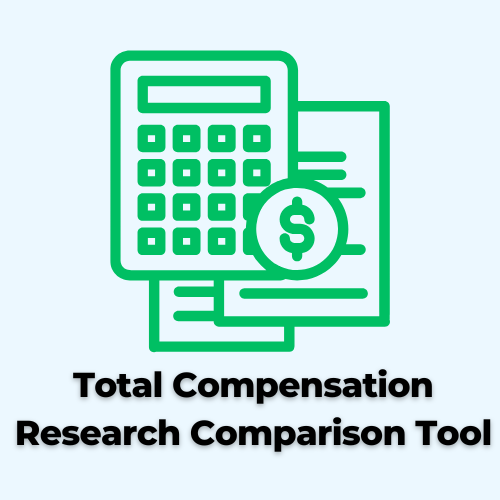
- Understand Total Compensation – Use our tool to break down and calculate the compensation in your job offer.
- Research & Compare Offers – Organize your compensation research and determine the right counter amount.
- Get Here
2) COMPLETE DUE DILIGENCE ON YOUR MICROSOFT JOB OFFER BY ASKING THE RIGHT QUESTIONS.
We can’t emphasize this enough: ensure you understand your offer before you start negotiating and then before accepting. Asking good questions not only shows that you’re doing your due diligence, but it’s foundational for crafting an effective and successful counteroffer. These can include questions like: What does the annual equity refresh look like at Microsoft? Why does Microsoft offer less vacation days compared to its competitors?
Whatever you do, don’t skip this step. It allows you to pull additional data points from the recruiter that will strengthen your justification for why they should consider your ask. Even if you think you already know the answers, it’s still important for you to ask; by asking thoughtful questions, you’re already building your case for a more compelling offer to the recruiter. You can use our list of Strategic Questions to Build Negotiation Leverage if you need help finding the right questions to ask about your Microsoft offer letter.

- Build Negotiation Leverage – Ask the right questions to strengthen your negotiation before sending a counter.
- Email & Phone Scripts – Get our list of questions to ask and what to say if the recruiter wants to chat through them.
- Get Here
While it’s normal to ask for more time to process the offer, starting this phase of the negotiation right after you receive the initial offer is important in showing you’re interested in the role.
3) RESEARCH THE COMPENSATION RANGES TO IDENTIFY WHAT YOUR COMPENSATION SHOULD LOOK LIKE.
Because Microsoft is a tech leader who uses data to make decisions, you must gather your own data to understand the role’s pay range, the strength of your offer, and how much you should ask for based on your specific role and its location (i.e., is this for a Microsoft product manager salary in Seattle or senior software engineer salary Microsoft in another city).
Payscale, Glassdoor, and Comparably can provide helpful data on salaries and other compensation components, but be sure to reference multiple resources. Be aware that these pay ranges are publicly reported by current/past employees so the pay may differ from what they may offer new employees and it might be inaccurate if the employee didn’t record all compensation components. You can download our Total Compensation Research Comparison Tool to help you with your Microsoft compensation research.

- Understand Total Compensation – Use our tool to break down and calculate the compensation in your job offer.
- Research & Compare Offers – Organize your compensation research and determine the right counter amount.
- Get Here
As a new hire, you’ll want to push for at least the mid-to top-end of the total compensation range—regardless of your experience or background.
4) SEND A MICROSOFT COUNTErOFFER TO THE RECRUITER.
Once you’ve completed prepping for the negotiation (via the first three steps), you’re ready to send over a salary negotiation counter—the official start of the negotiation process.
In this step, you’ll respectfully present your ask to the Microsoft recruiter by referencing your research and how the benefits differ from other companies’ and/or your current role. This can be done over the phone, but we strongly recommend doing this via email so you have everything in writing, and so the recruiter accurately shares your offer with the hiring team. Always remember to be professional and courteous; while the recruiter works for the company, it’s also in their best interest to get you to accept the position. Check out our Counteroffer Drafts for examples if you need help formulating a strong Microsoft counteroffer.

- Proven Counteroffer Templates – Built from hundreds of successful job offer negotiations.
- Negotiate with Confidence – Remove the guesswork with our professionally crafted counteroffers.
- Get Here
5) HANDLE ANY OBJECTIONS FROM THE RECRUITER AND ACCEPT THE ROLE KNOWING YOU ACHIEVED THE BEST OFFER.
Sometimes it only takes one counteroffer and the Microsoft recruiter will respond with an updated offer. Usually though, you’ll receive reasons from the recruiter for why the Microsoft hiring team cannot make any increases on the offer. If that happens, it’s best to see their “NO” as an objection that you need to overcome vs. an actual “NO” that you should accept.
In this case, respond by acknowledging their constraints, but reiterating your concerns and your desire for them to share your thoughts with the team (even if they say that their team will just say no). Use this approach regardless of the recruiter’s reasoning and follow all of our recruiter objection scripts if needed.
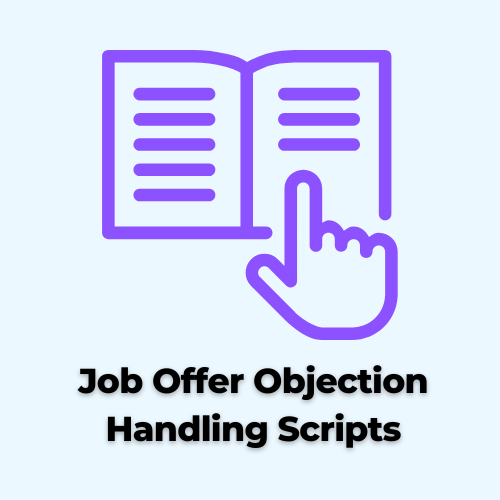
- Overcome Recruiter Pushback – Proven scripts to handle pushback and keep your salary negotiation on track.
- Communicate Effectively – Use expert responses to get recruiters to advocate for you with the compensation team.
- Get Here
You may have to handle a few objections but once they agree to take it back to their team, they should come back with a better offer. Continue to remain respectful and professional as you navigate any objections, and take care not to be confrontational or demanding.
Once you receive an updated offer that fits your personal needs and matches the pay bands you researched, you should be ready to send an acceptance email. Congratulations!
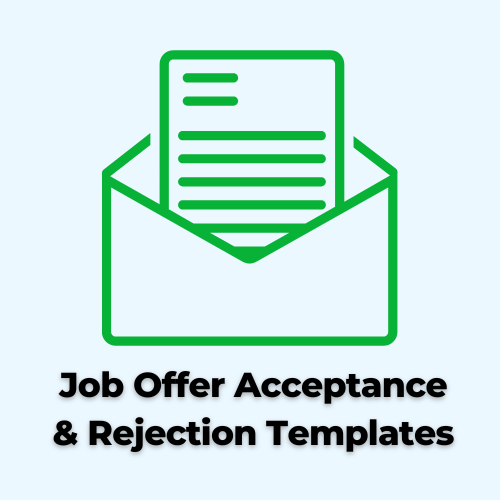
- Accept or Decline – Expert crafted job offer acceptance email and rejection email templates to share your decision.
- Professional & Genuine Tone – These help you communicate in a professional manner regardless of what you decide.
- Get Here
Negotiation Mistakes to Avoid During your Microsoft Salary Negotiation
Following the above five steps is essential for a successful salary negotiation, but there are some mistakes you should avoid to ensure you get a competitive offer—especially since Microsoft recruiters are trained to get the best deal for the company.
AVOID SHARING SALARY EXPECTATIONS BEFORE YOU GET A JOB OFFER AT MICROSOFT.
In our experience, sharing your salary expectations can work against you in receiving a fair offer. Microsoft recruiters might tell you that if they know your salary expectations then they can try to find the best deal for both you and their team. It sounds like a logical request, but remember that they’re working for Microsoft, not you, and they could use that information against you.
For example, if you share a lower compensation than what they could offer, they are more likely to offer you that low compensation. Alternatively, if you name a number higher than what they can offer, there is a chance that they could become disinterested and decide to go with a different candidate. Further, it doesn’t make sense to discuss compensation before you learn more about the specific role and the benefits Microsoft can offer you. Don’t forget that you’re also interviewing them so use our salary expectations scripts to avoid sharing your pay details.
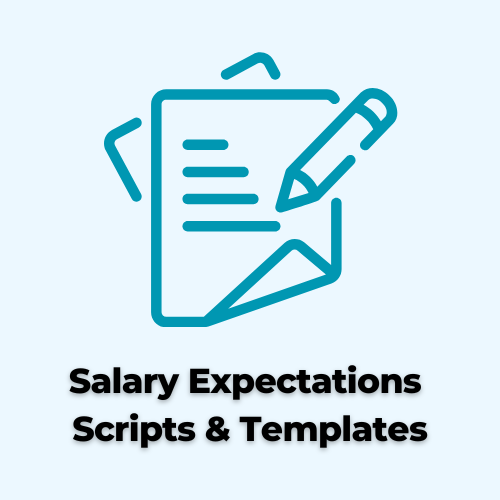
- Salary Expectation Responses – Scripts to overcome recruiter salary expectation discussions and pre offer calls.
- Avoid Lowballing Yourself – These call scripts and email templates will help you get a competitive offer.
- Get Here
DON'T BE AFRAID TO NEGOTIATE A MICROSOFT Salary
Many people are afraid to negotiate out of fear of losing the job offer or sounding rude to the recruiting team. However, we’ve helped facilitate hundreds of successful salary negotiations, and we’ve never seen Microsoft pull a job offer because a candidate tried to negotiate. It's generally expected, regardless of the role level at Microsoft—whether it’s an individual contributor, Microsoft engineering manager salary, Microsoft director salary, or a Microsoft VP salary—you should negotiate your salary package.
Don’t let salary negotiation myths or hearsay talk you out of advocating for yourself and earning a competitive Microsoft salary.
BE REALISTIC BY DOING YOUR RESEARCH.
Microsoft pays extremely well but it’s important to be realistic and only push for compensation that the Microsoft team can realistically provide. Understanding your total compensation and researching what Microsoft pays for your specific role will help you know what compensation is appropriate.
Microsoft Salary Negotiation Coaching & Tools
Increasing your Microsoft compensation requires a deep understanding of the company’s compensation philosophy and the right salary negotiation strategy. Our expert Salary Negotiation Coaching will help you navigate the Microsoft salary negotiation process and secure the top end of the pay band.
Or leverage our Salary Negotiation Courses and Salary Negotiation Scripts.
 Job Offer Negotiation Course
Job Offer Negotiation Course
- Get our job offer negotiation strategies, templates, scripts, and guidance.
- Access our step-by-step lessons, compensation research guides, and tools.
- Access Now
 Raise Negotiation Course
Raise Negotiation Course
- Get our raise negotiation strategies, templates, scripts, and guidance.
- Access our step-by-step lessons, compensation research guides, and tools.
- Access Now



